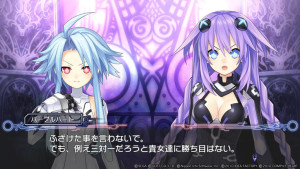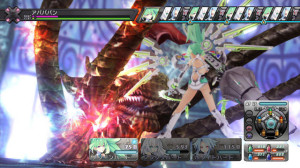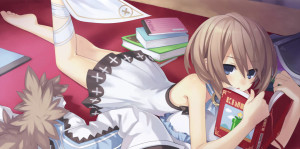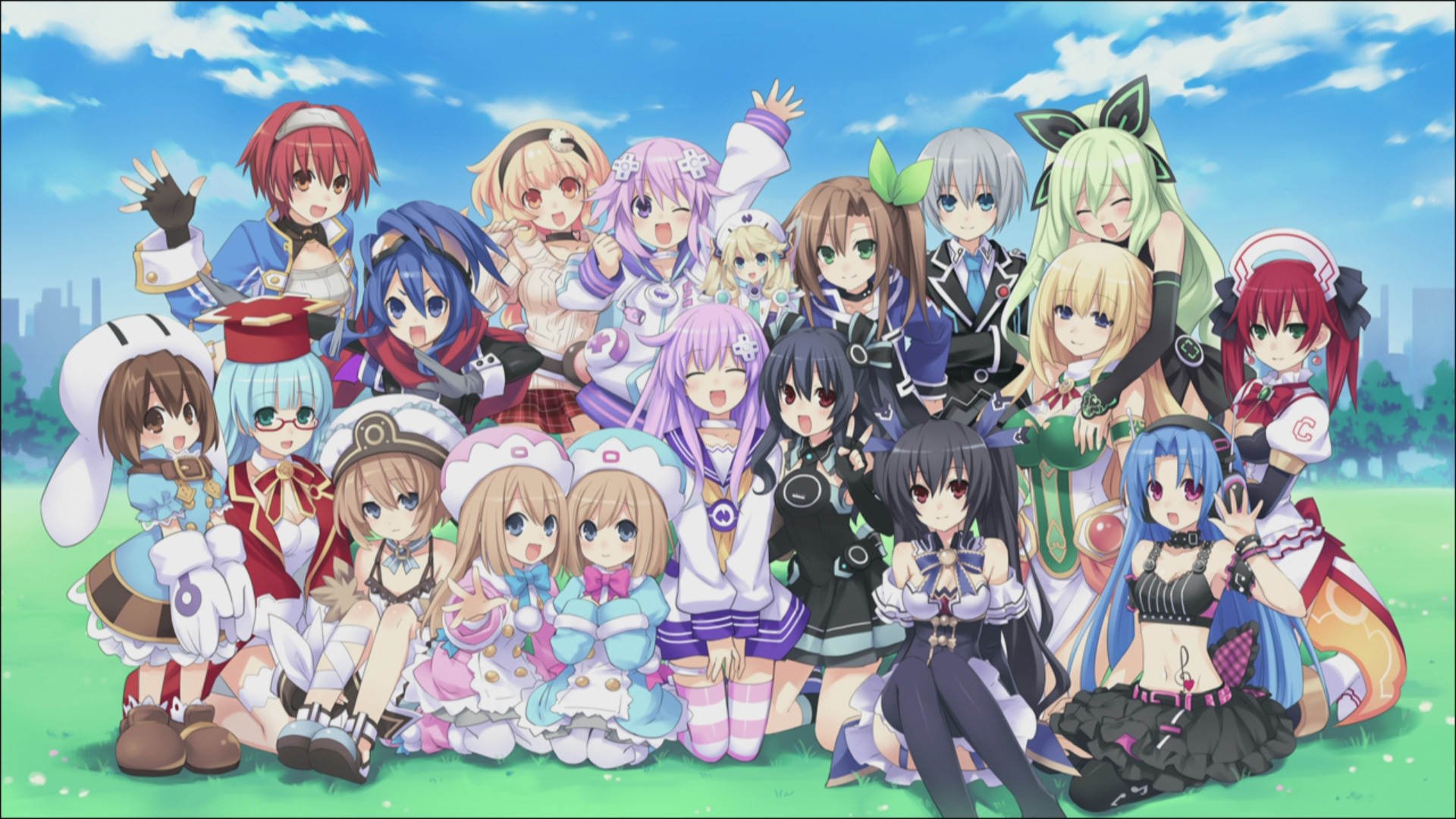Four console personifications, witty fourth wall breaking humor, light hearted story and endearing characters – what could go wrong? Hyperdimension Neptunia is a staple JRPG that isn’t afraid to make fun of itself but doesn’t exactly break new ground in terms of story, characterization, or gameplay. The short version is that the game nails it on the writing & characters but falls flat in regards to dungeon design, optimization, and 3d design shortcuts (fog, sluggish battle system, etc.) Before we are able to objectively judge this game though, I find it necessary to observe the game’s troubled development cycle.
Hyperdimension Neptunia was not a game developed with a large budget – it was delayed several times from fund issues and almost wasn’t even released. Despite featuring what I believe to be completely kickass character art, the game had hit several roadblocks in development. These issues are very prevalent in the game itself and do little to hide themselves. When first released, this game received a lot of criticism and some of it justly so – it does have its problems. That said – I still love it. If you’re interested in knowing why, read on! If not, the long and skinny of it is that everyone and their dog didn’t like this game; on paper and in technicalities, it is easy to see why. Now, actually playing the game produces different results, in my opinion.
Let’s start with the story. The four goddesses, who vaguely resemble and represent the game consoles of their respective nations, fight out for dominance in a celestial realm away from humans. They rule over humans by ruling each of their lands: Planeptune, Lastation, Lowee, and Leanbox. Arfoire, a fallen goddess who ruled in this celestial realm before the current four goddesses, sealed away their guardian Histoire and wreaks havoc upon the human realm. Due to her own hubris as well as the fact that the four goddesses do not get along, Neptune is forcefully ejected from her home in the celestial realm and loses all memory of her time there. Upon landing, she meets Compa, a nurse in training and IF (affectionately called Iffy), a guild member who doesn’t believe in the rule of the godesses. On paper, this sounds fairly typical – and it is – until you begin playing.
I’ll begin with the good elements of the game: The story, characters, and art design.
 The writing is light and fun, and so are the characters reading the lines themselves. Neptune is an adorable airhead and somehow managed to not only never be annoying to me, but to be endearing. Compa, who takes the airhead thing to even further extremes, is also very likeable. Iffy is my personal favorite and without her I doubt we’d see much progress in the story, but she has a certain motherly quality to her in the way she watches over Compa and Neptune.
The writing is light and fun, and so are the characters reading the lines themselves. Neptune is an adorable airhead and somehow managed to not only never be annoying to me, but to be endearing. Compa, who takes the airhead thing to even further extremes, is also very likeable. Iffy is my personal favorite and without her I doubt we’d see much progress in the story, but she has a certain motherly quality to her in the way she watches over Compa and Neptune.
There is something wonderful and engaging about the story. Admittedly, you’re not playing the next Chrono Trigger or Final Fantasy here, but I was genuinely interested in how Neptune would regain her memory or if Compa and Iffy would ever discern her true identity. There’s also a fair bit of story here; while attempting to find Histoire, you’re not just killing time, you’re doing world building – you meet people, you get put into comical situations, you learn more about the characters in your party; each part feels distinctly “it’s own”, if you will.
I’m not sure if the game was intended to be played this way but I began the game on Planeptune, then went to Lastation, Lowee, and finally Leanbox. Admittedly there’s not much to do on Planeptune considering you are playing their goddess, but upon going to Lastation, the game’s format reveals itself to you. Upon entering Lastation, you meet Noire, one of the goddesses who ousted you in the beginning of the game. Of course, she is unaware that Neptune has lost all her memories. Throughout the bulletins and dungeons, you learn a great deal about Noire – she’s very responsible, handles herself well, is a bit lonely, and is definitely a tsundere as the sky is blue. You also come to realize just how well developed Lastation is as a country – very industrial, technologically leaps and bounds ahead of the other nations. Along the way you fight an evil “walmart-esque” corporation hellbent on defeating their competitors and you even enter a tech convention. Such is the format of Neptune, and let me say – it’s a great one, story-wise. I found myself falling in love with these characters who, on the surface, are nothing more than tropes of characters we’ve seen several times before, but there was something magical about them this time.
 Noire and Blance, easily the two “hardest of heart” of the goddesses actually like Neptune quite a bit despite their differences. Revealed in cutscenes and small conversations both inside and outside their basilicom, you begin to put together how the godesses really feel about one another. Did I care? Actually, I did – the tension between the goddesses and why they just couldn’t get the hell along was a major concern of mine.
Noire and Blance, easily the two “hardest of heart” of the goddesses actually like Neptune quite a bit despite their differences. Revealed in cutscenes and small conversations both inside and outside their basilicom, you begin to put together how the godesses really feel about one another. Did I care? Actually, I did – the tension between the goddesses and why they just couldn’t get the hell along was a major concern of mine.
Our human comrades have much to offer as well. Iffy is actually a member of the guild – a group of loyalists who don’t believe in the rule of the goddesses. This is particularly funny when you remember that Neptune is a goddess herself, whether she remembers it or not. Iffy’s motivations, personality, and sense of humor all come out in the dialog throughout the game. Compa is, well…Compa, but there’s something lovable about her as well – she’s always there to pick you up.
Of course, there is also your main adversary, Arfoire, the fallen goddess, who seeks to impede you at all costs. She’s a master of disguise, so naturally you see her in many forms. Armed with her trademark laugh and a care-for-nothing attitude, she’d love nothing better than to stomp the goddesses out of existence. We have a thing or two to say to her about that. Even Arfoire worked her way into my heart as a villain that you, honestly, felt sorry for but were fond of – think of a Team Rocket that was actually marginally threatening and wasn’t annoying.
While on the surface the game appears to have a very silly plot and hilarious writing (the scene with Neptune leaving her comrades because she’s stuck on the toilet comes to mind) – there is actually a serious story underneath the cute character designs and silly dialog. Arfoire resents her time in the celestial realm, resents humans, and resents all Histoire and the goddesses stand for. Iffy is conflicted about her duty to the guild and assisting Neptune and Compa with the goddesses. Noire actually wants Neptune as a friend, despite not outright saying so. Blanc greatly respects Neptune’s aptitude for positive energy, although she’d never admit it. Vert, who is easily the most understanding and mature of the four goddesses, believes the four of them would be better off working together.
Before I end my comments on the positive of Neptune, let me add a bit about the DLC characters Gust & Nisa – both are also great characters that I feel add a lot to the plot. I recall with much fondness the two brothers that impeded Nisa in her introductory cutscenes; these are some of the best moments of the game and where I feel Hyperdimension Neptunia stands the strongest.
 Now, unfortunately, for the bad – the gameplay. The dungeons are repetitive and uninteresting, but thankfully they are rather short. They’re “randomly generated” but the gameplay focus is almost always on the bosses or combat, so it is of a minimal bother to me. The story had enough driving force to keep me chipping away.
Now, unfortunately, for the bad – the gameplay. The dungeons are repetitive and uninteresting, but thankfully they are rather short. They’re “randomly generated” but the gameplay focus is almost always on the bosses or combat, so it is of a minimal bother to me. The story had enough driving force to keep me chipping away.
Honestly, the game could be optimized better; it’s plagued with slowdown and draw distance issues, especially in battle. No doubt a result of the game’s budget, the models themselves look great until they move; they’re a bit stiff.
The battle system itself is actually really stylishly laid out, but does have some perfunctory weaknesses; limit breaking will cause you to have to do strange things like skip battle animations so that you can make the most out of the situation. The “combo” system that is present in the game is also needlessly complex and impossible to fully utilize. The animations, while really cool and very stylish, could definitely be seen as time consuming and annoying to many.
The CPU addon parts for the goddesses themselves also seem to be relatively useless – some equipment seems to serve no purpose at all.
The shares system is, unfortunately, one of the game’s biggest downfalls. The more Neptune dies in your game, the more your shares decrease. But hey, this isn’t a problem, right? Wrong. It’s permanent, and you aren’t informed of the consequences of these actions by the game itself. Furthermore, lacking shares will lock you out of the best ending near the end of the game where it becomes necessary to recruit the goddesses.
In game length, I never felt as thought the game outstayed it’s welcome. Other than the particularly egregious, I enjoyed the experience and honestly – I’d play it again. With witty dialogue and memorable characters, I can say it was an enjoyable romp. I may not need to play this version again, however. There’s a remake on the way this summer for the Vita that is supposedly much better and now ties in with the universe of Mk2 and Victory. Looking forward to it!
The bottom line? I’d give the game a solid 7.5. I feel the game was rather unfairly panned given its better aspects and with those aspects in mind, I declare it a resounding, surprising success; it’s rare to have a game exude such personality such as this. I’d much rather play a flawed game with personality and ingenuity than a perfect game with no personality, if that makes any sense at all. No, I’m not trying to be profound, goodness. Should you play it? If you want to kick back, relax, and enjoy some RPG action at your leasure and you’re okay with kawaii-ass anime girls, then yes. Give it a go. But make sure you play the sequels – they’re much better.






